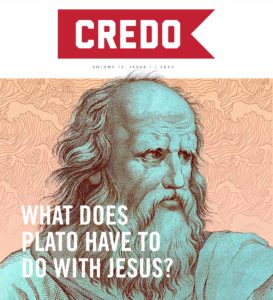While our beliefs as Christians are obviously rooted in Scripture and in traditions of practice, doctrine, and theology, our beliefs’ content builds upon ancient Greek thought, especially that of Plato and Aristotle. Those thinkers have provided us with abstract concepts—like nature, cause, and soul—that allow for the precise expression of the truths of the Faith. To really understand what we believe, we must grasp how these historical roots have shaped our faith.
Transcendence and Goodness
Plato argued for the transcendence and goodness of the first cause of all things.[1] Most significantly for Western Christians, this helped the young Augustine move away from Manicheanism (according to which there is a good god and an evil god and matter is evil) toward Christianity, which shares with Platonism the view that all things have their origin in one perfectly good cause.[2] Plato held that what we grasp intellectually are things’ natures—ethical natures like justice itself or mathematical ideas like triangularity in itself. Sense perceivable things share in these natures; for example, some sensory things are just, and some are triangular. But no sensory, material thing has the fullness of a nature: nothing we encounter in the material world is perfectly just or triangular.[3] Plato concluded that what is most real are those natures themselves, which he called “Forms.” On a Christian reworking of this view, some Forms (like mathematical natures) are ideas in God’s mind, while other Forms (like Goodness or Beauty themselves) are identical to God. We are called to allow our minds to be raised to contemplation of and union with those highest Forms, that is, with God.We are called to allow our minds to be raised to contemplation of and union with those highest Forms, that is, with God. Click To Tweet
By contrast, in many texts, Aristotle suggests that what is truly real are not transcendent Forms, but material, sense-perceivable things, which can be understood in themselves. Each material thing contains its own form, whereby it has its nature and is understandable.[4] Furthermore, Plato thought that to know what is good for human beings to do, we must know the Form of Goodness itself (which, on a Christian reading, is God). Aristotle, by contrast, contended that we can figure out what is good for us to do by thinking about the worth of actual concrete goods that we pursue. We need not know the Form of Goodness to know what is ethically good for us to do.[5]
Plato, Aristotle, and Thomas Aquinas
Like Aristotle and against Plato, Thomas Aquinas—one of the first Christian thinkers to draw heavily on Aristotle—thinks that each material thing has its own form.[6] Thomas often uses Plato as a foil for his view of human persons: whereas Plato thinks we are essentially just souls, Thomas argues that we are composites of soul and matter.[7] That is the condition in which we are created; it is a good condition, and it is what the Son of God assumed in the Incarnation.[8] Our perfection, our faith teaches, is not to exist as a disembodied soul, but to live as resurrected bodies. All these Christian views, Thomas thinks, are better explicated with Aristotelian principles, rather than Platonist principles.[9]Aristotle thinks that all things naturally act in such a way that they strive for beauty, that the goal of human life is to become beautiful, and that virtuous action is beautiful action done for the sake of its beauty. Click To Tweet
But despite these oppositions, Plato also had a profound impact on Aristotle and Thomas. For Plato, the highest Form, the source of all that exists, is the Form of Goodness and Beauty. To be good and beautiful is to give of oneself and reveal oneself in such a way that one calls attention to oneself, not narcissistically, but so as to make others self-giving and self-revealing.[10] If absolute Goodness and Beauty are God, the world is a “theophany,” a revelation of God. This view of Plato’s was adopted by early Christian thinkers like Dionysius the Areopagite, on whom Aquinas draws a great deal—but it was also held by Aristotle.[11] While Aristotle does not think we need to know Goodness itself to know what is good to do, he does think that God, the Prime Mover, the perfect being whom all others try to imitate, is perfect Goodness and Beauty.[12] Like his teacher Plato, Aristotle thinks that all things naturally act in such a way that they strive for beauty, that the goal of human life is to become beautiful, and that virtuous action is beautiful action done for the sake of its beauty—that is, done because the action is radiantly, attractively good in itself.[13]
Theophany
Thomas too organizes most of his writings and his entire system of thought—a system that has influenced all the most important subsequent Catholic and Protestant thinkers—around this idea of theophany, of things coming forth (exitus) from God and being called to return (reditus) to him.[14] All creatures come forth from the God who is beauty and goodness themselves, and their forms are “rays of divine beauty,” calling us to reflect upon them and so become aware of God.[15] Hence, he says that form is something “divine” in things.[16] This is not meant in a pantheist sense, as if God is a part of each thing. Rather, each being is a reflection of the Beauty that made it. We can reason from how the world beautifully appears, to the existence and attributes of the Beauty and Goodness that made it, as Thomas does, for example, in the fourth of his five arguments for the existence of God (where he calls beauty “nobility”).[17] We are called to imitate that Beauty Who first made us and gave us grace through the beauty of virtue.[18]Everything that occurs, down to the smallest detail, is decreed by God because it is a revelation of God, resulting from the Goodness which God is. Click To Tweet
While Thomas agrees with Aristotle that each being has its own form, by which it is a member of its specific kind, he agrees with Plato that there is a transcendent Form for pure perfections like truth, goodness, and beauty.[19] The world is the unfolding and revealing of that perfect Form, which is God. This idea stands at the roots of Thomas’ theory of providence and predestination.[20] Everything that occurs, down to the smallest detail, is decreed by God because it is a revelation of God, resulting from the Goodness which God is. While Thomas’ teaching that God predestines prior to any consideration of people’s merits or sins—since God’s grace is causative of, not responsive to, our good works—can be difficult for many to accept, we can understand it better in its Platonic context. Thomas inherits this doctrine not only from Christian Platonists like Augustine, but also from pagan Platonists like Proclus. On their view, each being, including each human life and action, only has its true meaning in the total revelation of God that each thing and the whole cosmos are.[21]
Even in the area where they seem most at odds, Thomas is heavily indebted to Plato. We have seen that for Plato, we are essentially just souls, whereas for Aristotle and Thomas (and for orthodox Christians in general) we are souls and bodies. But, following the Platonists, Thomas still emphasizes the great dignity of the human soul. For Plato, the human soul is akin to the immaterial beings that he calls gods and that Christians call angels. It can perform lofty intellectual acts like contemplating God.[22] Thomas agrees that we are intellectual beings destined to live like angels in contemplating God. God specially creates each human soul, and while he creates it to be the form of a body, it (not the body) is the primary thing that exists in us. The human body only exists and has its properties by sharing in those of the soul. For this reason, the soul is naturally immortal. When we die, our existence and our formal identity remains, such that the full person can come back into existence at the resurrection.[23]
The human body only exists and has its properties by sharing in those of the soul. For this reason, the soul is naturally immortal. Click To TweetFor all these claims, Thomas is greatly indebted to Plato. Indeed, we should see in Thomas not an opposition between Plato and Aristotle; rather, Thomas shows how, guided by Christian revelation, what is true in Plato and Aristotle can be reconciled and brought to its true, supernatural fulfillment.
[1] See, e.g., Plato, Republic 509b-c
[2] Augustine, Confessions VII.ix-xii
[3] See, e.g., Plato, Phaedo 75b-d
[4] Aristotle, Metaphysics VII
[5] Aristotle, Nicomachean Ethics I, chapter 6
[6] See, e.g., Thomas Aquinas, On the Principles of Nature; Commentary on Aristotle’s Ethics, book 1, lectures 6-8
[7] Plato, Phaedo 106b-e; Thomas Aquinas, Summa theologiae, First Part, Question 75, Article 4
[8] Thomas Aquinas, Summa theologiae, Third Part, Question 5, Article 1
[9] See Thomas Aquinas, Summa theologiae, Supplement, Question 75, Article 1
[10] Plato, Symposium 210a-212b
[11] Eric D. Perl, Theophany: The Neoplatonic Philosophy of Dionysius the Areopagite (Albany: State University of New York Press, 2008).
[12] Aristotle, Metaphysics XII, chapter 7
[13] See, e.g., Aristotle, Eudemian Ethics VIII, chapter 3
[14] Wayne Hankey, God in Himself: Aquinas’ Doctrine of God as Expounded in the Summa theologiae (Oxford: Oxford University Press, 2000)
[15] Thomas Aquinas, Commentary on Dionysius’ Divine Names, chapter 4, lecture 5
[16] Thomas Aquinas, Commentary on Aristotle’s Physics, book 1, lecture 15
[17] Thomas Aquinas, Summa theologiae, First Part, Question 2, Article 3
[18] Thomas Aquinas, Summa theologiae, Second Part of the Second Part, Question 145, Article 2
[19] Thomas Aquinas, Commentary on Dionysius’ Divine Names, preface
[20] See, e.g., Thomas Aquinas, Summa theologiae, First Part, Questions 22 and 23
[21] See, e.g., Thomas Aquinas, Commentary on the Book of Causes, preface and lecture 3
[22] Plato, Phaedrus 246b-248c
[23] Thomas Aquinas, Summa theologiae, First Part, Questions 75 and 76


